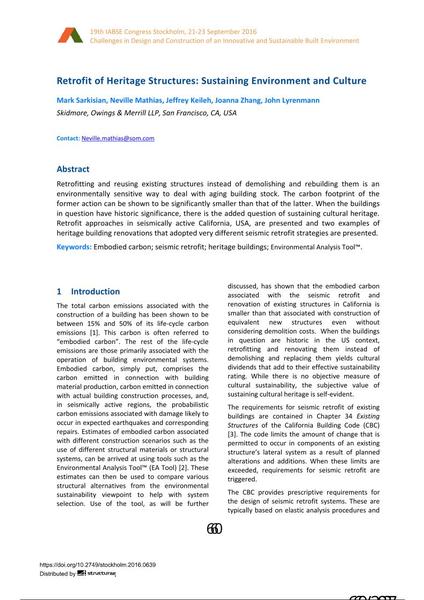Retrofit of Heritage Structures: Sustaining Environment and Culture

|
|
|||||||||||
Détails bibliographiques
| Auteur(s): |
Mark Sarkisian
(Skidmore, Owings & Merrill LLP, San Francisco, CA, USA)
Neville Mathias (Skidmore, Owings & Merrill LLP, San Francisco, CA, USA) Jeffrey Keileh (Skidmore, Owings & Merrill LLP, San Francisco, CA, USA) Joanna Zhang (Skidmore, Owings & Merrill LLP, San Francisco, CA, USA) John Lyrenmann (Skidmore, Owings & Merrill LLP, San Francisco, CA, USA) |
||||
|---|---|---|---|---|---|
| Médium: | papier de conférence | ||||
| Langue(s): | anglais | ||||
| Conférence: | IABSE Congress: Challenges in Design and Construction of an Innovative and Sustainable Built Environment, Stockholm, Sweden, 21-23 September 2016 | ||||
| Publié dans: | IABSE Congress Stockholm, 2016 | ||||
|
|||||
| Page(s): | 660-667 | ||||
| Nombre total de pages (du PDF): | 8 | ||||
| Année: | 2016 | ||||
| DOI: | 10.2749/stockholm.2016.0639 | ||||
| Abstrait: |
Retrofitting and reusing existing structures instead of demolishing and rebuilding them is an environmentally sensitive way to deal with aging building stock. The carbon footprint of the former action can be shown to be significantly smaller than that of the latter. When the buildings in question have historic significance, there is the added question of sustaining cultural heritage. Retrofit approaches in seismically active California, USA, are presented and two examples of heritage building renovations that adopted very different seismic retrofit strategies are presented. |
||||
| Mots-clé: |
reconception pour effets sismiques
|
||||
